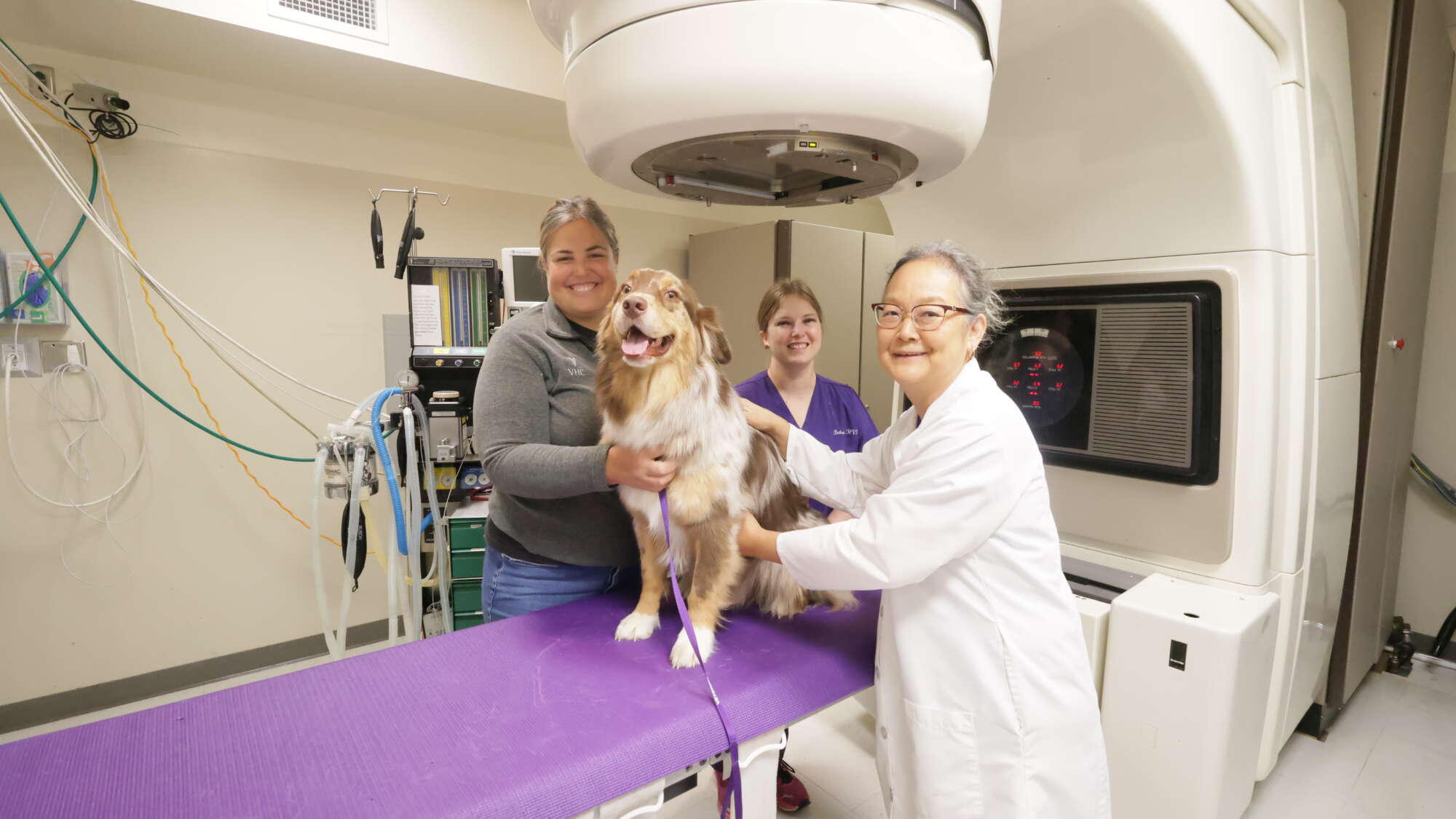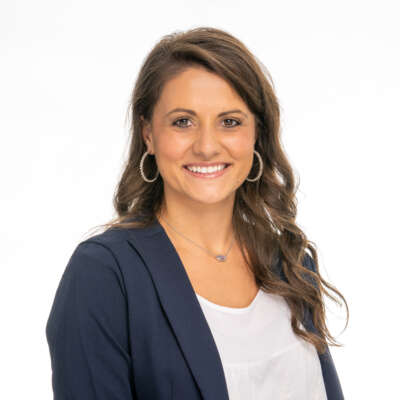Pets in Kansas and surrounding states that need radiation cancer treatment have just one place to turn: K-State. But that care is at risk.
“I was heartbroken. He has a piece of my heart, and after hearing his diagnosis, I just held him and cried.”
Jaime Welch, a client of the K-State Veterinary Health Center, sought life-saving care for her Boston terrier, Pistol, after he was diagnosed with a brain tumor.
“I have two boys. One joined the Navy and the other went to college. Then I got a divorce, so I was home alone except for my dogs,” Welch said. “They got me through the low times and were there during the high times. They were my support system.”
Her support system is made up of two Boston terriers. The girl dog is a little skittish, but then there’s Pistol.
“He’s my buddy. He has a big personality, wants to play ball, follows me from room to room, and sleeps with me,” she said. “He has a piece of my heart.”
After Pistol’s diagnosis, the closest place for him to receive radiation therapy was at K-State. Welch lives south of Oklahoma City, and Pistol needed 20 treatments, so that meant many five-hour drives to and from Manhattan.
“I would get him there by 8:30 on a Monday morning, then we would come back to pick him up on Friday afternoon,” Welch explained. “He would get to come home on the weekends, then we’d go back up on Monday mornings.”
STEPPING UP VITAL CARE
K-State is the only place in Kansas that can do radiation therapy for small animals, and it also provides care for patients in Oklahoma, Nebraska, western Missouri and Arkansas. It’s the place pet owners rely on.
But K-State could do more. With a new linear accelerator, the machine used to administer radiation therapy, treatments could be cut by more than half.
K-State’s current unit is more than 30 years old and was refurbished from a human health center. After 10 years at the KSU-VHC, it is ready to be retired. It relies on antiquated imaging technology, which is time consuming and has lower quality imaging than newer technologies. Finding parts and repairing the equipment is difficult because the original manufacturer considers its current technology “obsolete” and no longer services it.
And long and frequent radiation treatments cause stress on the animals and their owners, as well as veterinary staff.
“Right now, it’s all manual,” explains Dr. Chieko Azuma, clinical associate professor of radiation oncology. “If I need to position the patient when targeting the treatment area, I need to shift the radiotherapy couch in three independent directions to get it centered. But with newer technology, the couch moves to the treatment location based on the computerized radiation therapy plan, eliminating human error and stress on the operators.”
For these reasons and more, K-State and the KSU Foundation are working to raise funds for a new linear accelerator and a larger vault (room). The new vault, which requires lead and concrete re-enforced walls, will accommodate the newer technology, provide additional patient care areas, and be able to accommodate all types of animals from dogs, cats, rabbits to even horses.
A new linear accelerator with cutting-edge technology will improve care and reduce treatment time. The state-of-the-art equipment features an onboard imaging system that helps the operator “see” a tumor just before treatment, allowing the patient to be aligned perfectly with the radiation beam. The custom radiation beam delivers a high-dose targeted therapy that can be adjusted based on tissue type and is able to more specifically reach tumor areas, resulting in fewer side effects, less discomfort for the patient and possibly better treatment outcomes.
While the new equipment will give K-State oncologists the ability to provide personalized cancer treatment for all their patients, an added benefit is that it may also dramatically reduce treatment times — in some cases from four weeks of daily treatments to just three days.
Welch said this would have made a huge difference for her and Pistol.
“I could have brought my laptop and either rented an Airbnb or gotten a hotel and worked from Manhattan,” she said. “It would have been one trip to K-State instead of several back-and-forth trips.”
GAME CHANGER
A new linear accelerator will also be a game changer for K-State and its veterinary oncology program. Students and residents will gain more up-to-date, hands-on experience. And the program could expand to help more patients, both small and large animals.
“We hope to expand our oncology services by establishing a radiation oncology residency program. This would enhance our ability to provide comprehensive care while creating valuable educational opportunities,” Azuma said. “We are excited about the unlimited potential this new technology offers, advancing our ability to fight cancer and give families more time with their beloved pets.”
Dr. Sarah Kaufman, a veterinarian in Lawrence whose Great Dane, Oak, received radiation therapy at K-State for an oral tumor, says the new linear accelerator would also be a game changer for her clients.
“As a referring veterinarian, I talk to people about radiation therapy and some of them say they can’t leave their dog for a month,” Kaufman said. “They don’t want to be separated from their pet for that long and can’t handle the logistics of driving to Manhattan so often. But by cutting down the radiation time to a few days, more pet owners would consider radiation as an option.
“The bigger the program, the more people will be educated about what it means for their pet to receive radiation therapy,” Kaufman explained. “It’s humane, lifesaving treatment, and if K-State had a bigger, state-of-the-art radiation oncology program, more pets would benefit.”
A FULL LIFE
Both Pistol and Oak are doing well after their treatments. They’re both back to playing ball and spending quality time with their families.
“K-State has a special place in my heart because of what they’ve given me,” Welch said. “I can’t speak highly enough about K-State and what they’ve done, but if they have even more advanced equipment and a larger program, that could benefit so many.”
The personal touch K-State brings to all its clients is the cherry on top of the exceptional health service provided to animals in the region.
“The benefit of K-State compared to some privately owned specialty hospitals is that there’s all these people working with your pet and emotionally invested in your pet,” Kaufman shared. “There’s no substitute for a voice on the phone that can say, ‘I was just with Oak and he went outside for a walk, ate his dinner, and he’s doing fine.’”
BE A HERO
Give here to help K-State acquire a new linear accelerator.






